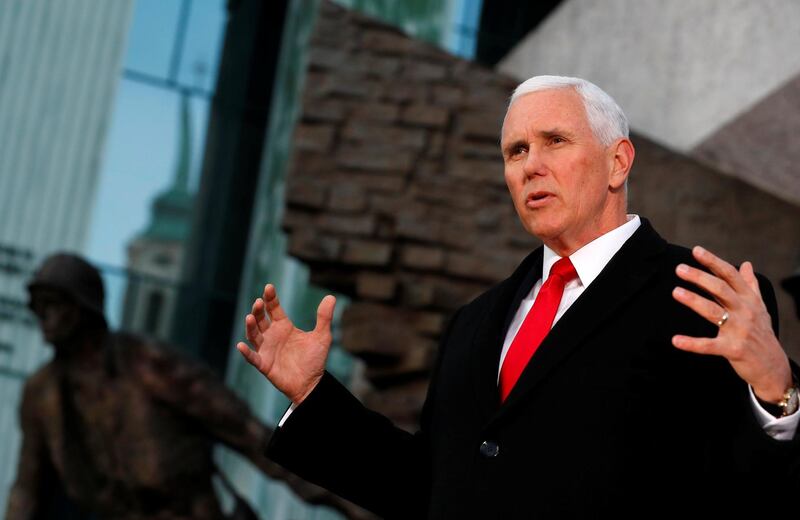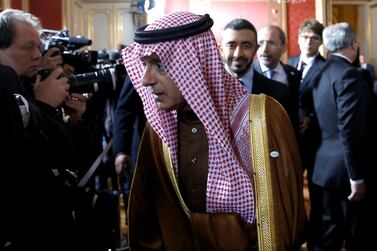US Vice President Mike Pence told an international summit on Thursday that America’s allies must stand with Washington in its showdown with Iran, warning that sanctions targeting the regime will “get tougher still”.
Speaking of the US withdrawal from the 2015 nuclear agreement and reimposition of sanctions, Mr Pence told the Peace and Security in the Middle East meeting in Poland that the choice was with us or against us.
“If you stand with us in this noble cause, we will stand with you,” he said, adding sanctions imposed last year "will get tougher still unless and until Iran changes its dangerous and destablising behaviour".
Co-hosted with Poland, the reaction to the US-led meeting in Warsaw had been lukewarm in Europe. As leader of a large American delegation, Mr Pence hit out at European attempts to shore up the deal by setting up a trade mechanism to continue trade with Tehran. He described the move as attempt to break US sanctions.
"Sadly, some of our leading European partners have not been nearly as cooperative. In fact, they have led the effort to create mechanisms to break up our sanctions,” he told representatives of 60 nations gathered in Warsaw. "It is an ill-advised step that will only strengthen Iran, weaken the EU and create still more distance between Europe and the United States.”
Speaking at the same venue as US Secretary of State Mike Pompeo, he called on participants to make a fresh start in a new era of cooperation on the challenges facing the Middle East, including Iran, Yemen, Syria and the Palestine-Israel peace process. "The United States seeks a new era of cooperation between all of our countries on how to confront these issues," Mr Pompeo told foreign ministers and other officials from more than 60 countries in Warsaw.
A strong compliment of senior regional diplomats attended the meeting including Sheikh Abdullah bin Zayed Al Nahyan, Minister of Foreign Affairs and International Cooperation.
We join the #WarsawSummit to take a firm stand against forces that threaten the future of peace&security in the region, especially the world's leading sponsor of terrorism: the Iranian regime that continues to destabilize our region and launch ballistic missiles against civilians
— Khalid bin Salman خالد بن سلمان (@kbsalsaud) February 13, 2019
Mr Pompeo was direct in targeting Iran, calling it a very real threat. “They’re a malign influence,” he said. “The three H’s – the Houthis, Hamas, Hezbollah – these are real threats. There are others as well, but you can’t get peace in the Middle East without pushing back against Iran.”
US officials were privately bullish at the impact of the conference, noting the degree of cohesion among most of the delegates. Concerns over the lack of European high-level participation and trans-Atlantic disagreements fell away as Mr Pence and other US leaders made their participation.
"Behind the scenes there really was a great deal of concern over Iran and its activities, particularly among the regional states over the level of the threat that Iran poses," one US government official told The National. "I'll let the Europeans speak for themselves."
At a closed-door session, Mr Kushner briefed officials on his plan but US officials said concrete details were held back in light of the Israeli general election due on April 7. Nonetheless, diplomats saw the session as a “test” the ideas behind Mr Kushner’s work.
Another focus of the summit is expected to be Iran’s missile proliferation. US reports have suggested that America, under Mr Pompeo’s influence as first head of the CIA and now secretary of state, has resumed efforts to sabotage the Iranian programme.
Two rocket test failures on January 15 and February 5 are seen as the product of that covert activity.
At a closing press conference, Mr Pompeo said there had not been a single defender of Iran against the accusations laid by the US and others. These had ranged from regional meddling, including the Iranian role in Iraq, to Hezbollah networks in South America. “No country spoke out against the basic facts,” he said.
As co-hosts, Poland had been embarrassed by the emphasis put on Iran at the summit, especially as leading EU foreign ministers declined invites. Jacek Czaputowicz, the foreign minister, quietly took pains to say the Iranian issue had not dominated the discussions in the way that was portrayed.
The European countries attending the summit largely see eye to eye on the need to stop Iran’s missile advances and the topic offers a bridge over gaps between the two sides. “We disagree about the Iran nuclear deal but we share the same threat assessment, especially on missile testing and missile proliferation,” said Brian Hook, Special Representative for Iran at the State Department.
Another parallel session saw Sigal Mandelker, the undersecretary of the Treasury for terrorism and financial intelligence, lead discussions on tightening sanctions and Iran’s abuse of the SWIFT international financial settlement system, according to officials.
Among the most notable invitees to refuse to make an appearance were representatives of the Palestinians.
Nabil Shaath, a senior official, said the White House refusal to accept Palestinian statehood as the basis of the Kushner plan made it impossible for his side to attend. “The Trump team aims to use this conference as an event to push for their vision for Israel and Palestine, one that, based on the steps they have taken, is certainly not about peace-making,” said Mr Shaath.
After a suicide bomb killed 27 Revolutionary Guard troops, Iran’s foreign minister Mohammad Javad Zarif said it was “no coincidence that Iran is hit by terror on the very day…[the] Warsaw Circus” began.







